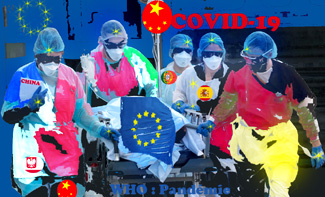
EUROPE before and after the Coronavirus 19 By MRI, Political Analyst
The health and lives of citizens must be a priority again.
Citizens are tired and upset by the chaotic way of managing crisis.
Lack of a common European strategy is evident.
Apologies and solidarity are not enough.
A concerted response and a common European strategy is needed.
- How was Europe before the Coronavirus outburst ?
- Before the sanitary crisis started mid-March 2020, Europe was characterised by a shaky world economic environment, the Brexit and the decadence of the European integration process.
- Individualism and consumerism seemed to be accepted and sustained by the world leaders.
- Discourses were oriented towards economic growth, the SPREAD, the rule of the 3% deficit: the theory of liberalism in all its beauty.
- Nothing could shake the belief that capitalism and consumerism combined were the only ways to find happiness. The world was animated by the politics of power and self-interest. The Brexit had given a bitter taste to Europe, while disaffection for its (dys) functionning and for its institutions grew.
- There was the climate change movement. No plan B for the planet! The youth came out in the streets to manifest against the previous generations that apparently had not thought about their future. How could have leaders of the world forgotten the protection of the waters, of the animals, of the air, and of the earth in general ?
- The economic growth dogma coupled with the belief that more goods and more commercial services would make the humanity happy, seemed to be shaken by a new concern: save the planet !
- While the anti-European Union movement had also started to grow in Italy and in Poland, the idea of a continent that was united only in self-interest protection was promoted.
- Citizens continued to complain about this Europe that did not do enough for its peoples. In less than 20 years, the system had created resistence and opposition by citizens.
- The communication efforts had been coupled by the use of social media to make the message go through to national audiences.
- The result was an increase of hostility and dis-belief.
- Then, in blink of an eye ….
2. The CORONAVIRUS came to Europe !
- The Coronavirus started first in China.
- So far away from Europe.
- In a few days the epidemy spread all over Europe. Italy was the first European country touched at its heart. In a few weeks the only word that was heard in Europe and Italy, in particular was: Death ! Death ! Death ! Death !
- Stay home ! Confinement ! The panic crossed our lives.
- The power of money was suddenly relative compared to the proximity of death.
- Death was not anymore only a remote possibility, but a very probable fact.
- The symptoms of the sick Western system came out once again as being evident: Italy was the most affected country to start with. Spain followed. The United States. And many others.
- Where was the European solidarity ? Where were our neighbours ? France ? Germany ? Where was Europe ? Once again the missed opportunity of showing deep cohesion among Member States, rather than communication strategies emptied of substance.
- Italy had asked in the beginning of the ‘epidemic crisis’ the support of the European Central Bank, and we know what happened : Christine LaGarde dismissed Italy’s request.
- Starting from the British prime Minister that adopted a different approach to confinement, and announced to the British people to be prepared to seee theirs cherished ones die. To discover at a later stage that he was tested positive to the Coronavirus. Followed by the French media, stating that they would not face the same crisis as in Italy as their hospitals were better equipped, and managed.
- National responses have shown the selfishness of the European Nations.
- One day 35 doctors came from Cuba. These doctors from Cuba interviewed spoke about solidarity and their sense of collective necessity.
- Why in Europe we cannot move in the direction of the solidarity, and of public services as a means of keeping social solidarity ? While European countries seemed skeptical in taking patients from Italy straight away ?
- The solitude of countries facing the Coronavirus has shown the limits of Europe as a solidarity actor. Solidarity does not seem to be a value for Europe. We talk about the solidarity on the ground, the one thar enters in peoples’ lives.
- To have an impact the European solidarity must be structured around institutional responses.
3. How will Europe be after the Coravirus ?
- Will Europe change after this experience ? Maybe.
- Will the ‘fast and furious’ rythm change ? Maybe.
- Will we have a new project of life ? Both collective and personal ? Will we re- think our societies ?
- Only time will tell.
- The reflection has started. The process of changing habits and beliefs is not easy.
- Once this crisis will be over the risk of going back to business as usual is high.
- This experience has also shown that being in a market economy does not mean that citizens do not need the State. On the contrary, the State is a key actor in the this process and the integration of Europe is necessary as well.
Why ?
- To rebalance the existing unbalanced system.
- In the collective interest, Europe must move towards more integration and common responses to collective challenges.





